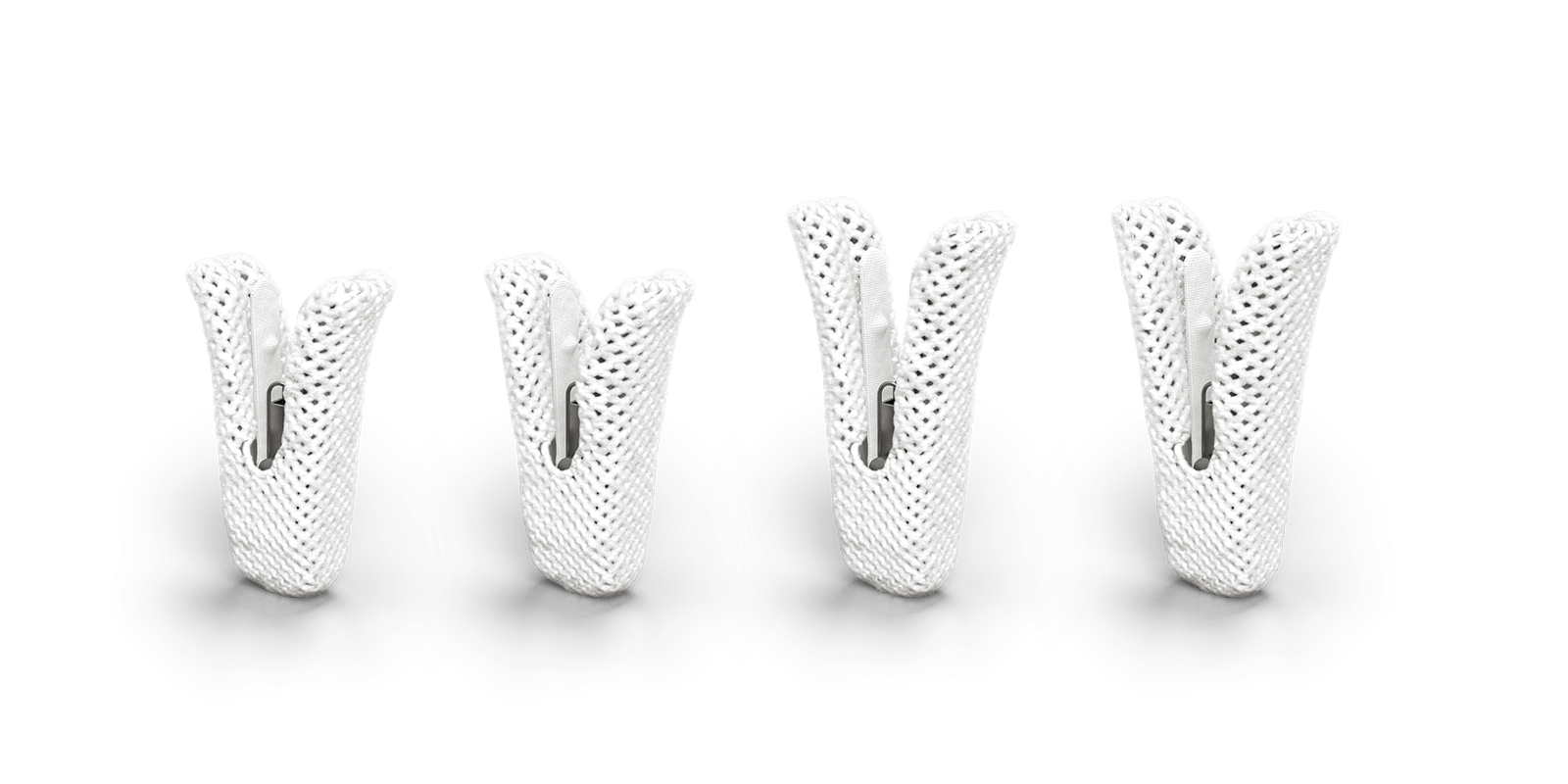EDGE-TO-EDGE REPAIR (TEER)
MitraClip™ is the first minimally invasive TEER* therapy that delivers a life-changing treatment option for selected patients with Primary Mitral Regurgitation (PMR) or Secondary Mitral Regurgitation (SMR) who would otherwise go untreated.1,2 MitraClip™ is the standard of care in TMVr built on proven mitral valve therapy with over 20 years of experience, an extensive body of clinical evidence, and more than 200,000 patients treated worldwide.3
TEER
- The only TEER therapy with positive durable outcomes to 5 Years.4-8
- Unparalleled clinical outcomes9
- The highest reported Mitral Regurgitation (MR) reduction9
- Significant improvements in functional status and Quality of Life, (QoL)9
- The only Transcatheter Mitral Valve (TMV) therapy that improved survival and Heart Failure (HF) hospitalization in Secondary MR.10

A SAFE TREATMENT FOR MITRAL REGURGITATION,
A HOPE FOR SELECT PATIENTS
Treating MR with MitraClip™ therapy can mean an improved Quality of Life and relief from the symptoms of Heart Failure. Clinical studies show that intervention with MitraClip™ Transcatheter Mitral Valve Repair (TMVr)—also referred to as TEER—can safely reduce MR in selected patients despite their age or high rate of accompanying serious comorbidities, such as heart failure.11

DISCOVER OUR LATEST CLINICAL OUTCOMES
EXPANDed
LEFT VENTRICULAR REVERSERE MODELING POST MITRACLIP™: Results from the EXPANDed Studies

1.3%

99%
EXPAND TREATMENT OPTIONS FOR SELECT HEART FAILURE PATIENTS
Results from the landmark Cardiovascular Outcomes Assessment of the MitraClip™ Percutaneous Therapy (COAPT™) trial established MitraClip™ therapy’s impact on heart failure patients with clinically significant secondary MR who remained symptomatic despite maximally tolerated guideline-directed medical therapy (GDMT). By decreasing MR, patients experienced:
- Improved survival10
- Reduction in HF hospitalizations10
- Improved Quality of Life13

MITRACLIP™ SHOWS DURABLE MR REDUCTION OUT TO 5-YEARS
At 5 years, 95% of MitraClip™-treated patients experienced MR≤2+, sustained from 93% at 30 days
Primary Safety Endpoint: Sustained Through 5 Years
Only 1% of MitraClip-treated patients (N=293) experienced device-specific safety events, with no new events after 30 days
| MITRACLIP IMPLANT ATTEMPTS (N=293) | 30 DAYS | 12 MONTHS | 24 MONTHS | 36 MONTHS | 48 MONTHS | 60 MONTHS |
|---|---|---|---|---|---|---|
| All safety events (%) | 4 (1.4) | 9 (3.3) | 13 (5.2) | 20 (8.8) | 22 (10.1) | 23 (10.8) |
| Device-specific events (%) | 4 (1.4) | 4 (1.4) | 4 (1.4) | 4 (1.4) | 4 (1.4) | 4 (1.4) |
-SLDA | 2 (0.7) | 2 (0.7) | 2 (0.7) | 2 (0.7) | 2 (0.7) | 2 (0.7) |
-Device embolization | 1 (0.3) | 1 (0.3) | 1 (0.3) | 1 (0.3) | 1 (0.3) | 1 (0.3) |
-Endocarditis requiring surgery | 0 (0.0) | 0 (0.0) | 0 (0.0) | 0 (0.0) | 0 (0.0) | 0 (0.0) |
-Mitral stenosis requiring* surgery | 0 (0.0) | 0 (0.0) | 0 (0.0) | 0 (0.0) | 0 (0.0) | 0 (0.0) |
-Any device-related complication requiring non-elective CV surgery | 1 (0.3) | 1 (0.3) | 1 (0.3) | 1 (0.3) | 1 (0.3) | 1 (0.3) |
| Progressive HF unrelated to device complications | 0 (0.0) | 5 (2.0) | 9 (3.8) | 16 (7.5) | 18 (8.8) | 19 (9.5) |
| -LVAD | 0 (0.0) | 3 (1.2) | 6 (2.6) | 11 (5.1) | 12 (5.8) | 13 (6.5) |
| -Heart transplantation | 0 (0.0) | 2 (0.8) | 3 (1.3) | 7 (3.4) | 9 (4.7) | 9 (4.7) |
SLDA = single leaflet device attachment. LVAD = left ventricular assist device. *Mitral valve area <1.5 cm2 by echo core laboratory measurement.
Treatment with MitraClip™ in control patients was an independent predictor of freedom from subsequent heart-failure hospitalization (HFH) or death.
Even after two years, crossover subjects* experienced outcomes similar to those initially in the device group; however, nearly half of the control group patients had died by the time crossover was permitted, emphasizing the need for early treatment with the MitraClip™ therapy.
MitraClip™ + GDMT patients were more likely to be in NYHA functional class I or II throughout the 5 years
MitraClip™ + GDMT patients benefited from a 47% relative risk reduction in HFH/ Death versus GDMT-alone7

REAL-WORLD EXPAND STUDIES SHOW UNPARALLED CLINICAL OUTCOMES9,14
The EXPAND and EXPAND G4 studies were prospective, multi-center, single arm, international, post-market, real-world, observational studies of patients who received MitraClip™ NTR/XTR and MitraClip™ G4, respectively.9,14
MR Reduction to ≤ Mild at 30 days achieved in 91% of subjects 98% had MR reduction to ≤ Moderate.
80% of patients with NYHA I/II at 1 year in EXPAND study14
83% of patients with NYHA I/II at 30 days in EXPAND G4 study9
EXPAND study 1 year14
21.6 POINTS IMPROVEMENT
in KCCQ-OS at 1 year14
EXPAND G4 study 30 days9
18 POINTS IMPROVEMENT
in KCCQ-OS at 30 days9
Hub
TV
- MitraClip™ G4 System Instructions for Use.
- Lim DS, Reynolds MR, Feldman T, et al. Improved functional status and quality of life in prohibitive surgical risk patients with degenerative mitral regurgitation after the transcatheter mitral valve repair. J Am Coll Cardiol. 2014;64(2):182–192. doi.org/10.1016/j.jacc.2013.10.021
- Data on file at Abbott.
- Feldman T, Kar S, Elmariah S et al. Randomized Comparison of Percutaneous Repair and Surgery for Mitral Regurgitation 5-Year Results of EVEREST II. J Am Coll Cardiol. 2015;66(25):2844–2854. doi.org/10.1016/j.jacc.2015.10.018
- Kar S, Feldman T, Qasim A, et al. Five-year outcomes of transcatheter reduction of significant mitral regurgitation in high-surgical-risk patients. Heart 2018;0:1–7. dx.doi.org/10.1136/heartjnl-2017-312605
- Lim S. Five-Year Durability Results Of Transcatheter Mitral Valve Repair With the MitraClip® System in Patients With Severe Degenerative Mitral Regurgitation and Prohibitive Surgical Risk. Poster presented at ACC 2018.
- Feldman T. The EVEREST II REALISM Continued Access Study: Five-Year Outcomes in High Surgical Risk Patients. Data presented at PCR 2018.
- Feldman T. The EVEREST II REALISM Continued Access Study: Mid- and Long-Term Follow-up in Surgical Candidates. Data presented at ESC 2017.
- Von Bardeleben, et al. Contemporary Outcomes of 1000+ Patients Treated with MitraClip™ G4: Results from the EXPAND G4 Post Approval Study. Data presented TCT 2022.
- Mack M. COAPT: Three-Year Outcomes from a Randomized Trial of Transcatheter Mitral Valve Leaflet Approximation in Patients with Heart Failure and Secondary Mitral Regurgitation. Presented at TCT 2019.
- MitraClip™ G4 System Instructions for Use.
- Stone GW. et al. Five-Year Follow-up after Transcatheter Repair of Secondary Mitral Regurgitation. N Engl J Med. March 5, 2023. DOI: 10.1056/NEJMOA2300213
- Arnold SV, Chinnakondeoalli KM, Spertus JA, et al. Health status after transcatheter mitral valve repair in heart failure and secondary mitral regurgitation. J Am Coll Cardiol. 2019;73 (17):2123–2132. doi.org/10.1016/j.jacc.2019.02.010
- Kar S. Core-Lab Adjudicated Contemporary Clinical Outcomes at 1 Year with MitraClip™ (NTR/XTR) System from Global EXPAND Study. Data presented at TCT 2020.